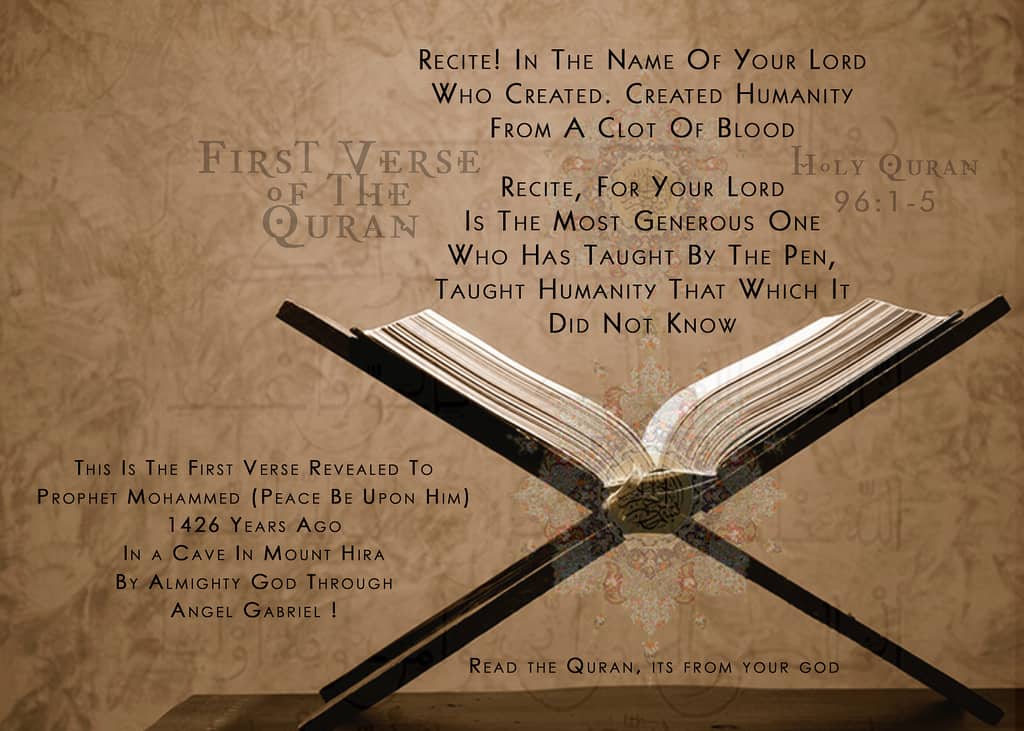A is for Allah Lord of the Universe, who is One, He made the earth, stars,
and sun He made angels to worship and pray, He made man from a dab of clay
B is for Bilal Bilal is that tall, brave African man, Islam freed him and gave him iman Calling the Muslims
to come and pray, Was his duty each night and day
C is for Children Black, white, red, yellow, and brown, Better than the jewels in a crown
Laughing or crying, short or tall, Allah loves children, one and all
D is for Du'a Remembering Allah all nights and days, By giving Him our thanks and praise
Thank Allah with "Al Hamdulillah" And praise Him with "Subhanallah
E is for Earth With its mountains, rivers, and seas, Animals, birds, fruits, and trees
They all declare Allah's Might, Following His laws, wills, and light
F is for Faith That which the Muslims call Iman, Is in the heart of the believing man
Will come from his lip and hand, Love for Allah pouring out like sand
G is for Gabriel An angel (called Jibraeel in Islam) created by Allah from light, His duty is to serve Allah
all day and night To Prophet Muhammad (S) he did appear, To bring mankind the Holy Qur'an so dear
H is for Heaven God's garden of joy, peace, and love,
The home for Muslim's souls above The path to this heavenly place Is faith in Allah's guidance and grace
I is for Islam A way of life for all of who, Give to Allah the praise that is due We worship
and pray five times a day, Because we know it is the best way
J is for Jesus Peace be upon him, 'Isa, the son of Maryam, To his people Allah's word did he carry
By Allah's help, he made the sick well, So people would believe what he had to tell
K is for Ka'bah First house of Allah in Makkah was made, By Ibrahim and Isma'il the stones were
laid Millions of believers from every race, Come for Hajj tot his extra special place
L is for Life A precious gift from Allah to you, Don't waste it, he knows what you do Don't chase
pleasure or forget Allah, No matter how little, say "Al-Hamdulillah
M is for Muhammad Peace be upon him, Abdullah's son, From Allah's enemies he did not run
Of all the Prophets, he was the last, Islam his message which we hold fast
N is for Nuh Peace be upon him, a Prophet who was very good, Allah told him to build an ark, fast as
he could Take pairs of animals and the believers-all, The flood was coming and the waves would be tall!
O is for Obedience It is the duty of each Muslim to obey, The Qur'an and the Sunnah all the
way Go for Hajj, give Zakah, fast, and pray, And to your parents do not say, "Nay!"
P is for Prayer. It is the cornerstone of Muslim life, And the devil it cuts like a knife
Prayer five times a day is a must, In Allah, you should put your trust
Q is for Qur'an A blessing and guide for all of mankind,
In it Allah's message you will find Of all His messages,
it is the last, Perfect for present, future, and past
R is for Ramadan. For Muslims this blessed month of fasting,
Is to celebrate Allah's love everlasting. All day, no food, nor drink,
nor evil deeds, Pray and read Qur'an, to heaven this leads
S is for Surah. One hundred and fourteen in the Qur'an,
Read them and trust in Al-Rahman,
Do you know ten of them that you can say?
Knowing them will help you pray
T is for Tawheed La ilaaha illallah, Allah is the only one,
There is no partner with Him, nor son Allah is the answer
to all that we need, Watch your heart and tongue, He knows every deed
U is for Ummah The Muslim community, which Muhammad (S) found,
The brotherhood of Islam made it sound Allah's laws in the Qur'an and Sunnah,
Are to help everyone in the Ummah




